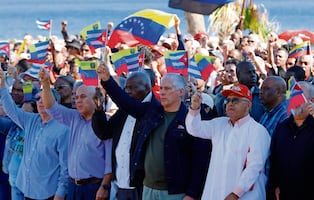Más Información

Descarrilamiento del Interoceánico: Cerré los ojos y sentí como se volteaba el tren, relata víctima; iba a exceso de velocidad, asegura

Arturo Ávila afirma que "Grandeza", libro de AMLO, le costó 100 pesos; entrega ejemplares a opositores
All but one nation in the Americas have criminal defamation laws that can be used against journalists to suppress freedom of expression, according to a report released on Wednesday.
Only Jamaica has entirely repealed laws that would permit journalists to be prosecuted for their reporting, according to the study released by the Committee to Protect Journalists (CPJ) and the Thomson Reuters Foundation.
Two-thirds of the countries in North, Central and South America routinely use such laws to silence dissent and keep information from their citizens, the report said.
"Despite the emerging consensus that criminal defamation laws violate international freedom of expression standards, the continued use of such provisions has deterred the aggressive reporting necessary for robust debate in a free and open society," CPJ's Carlos Lauria and Sara Rafsky wrote in the report.
"Even if infrequently applied, the continuing existence of these laws represents a lurking danger to free expression."
Laws that can be used against journalists include defamation, libel, calumny, or making false charges, and "desacato" offenses which refer to insulting or offending the state or state officials, the report said.
Specifically the report said 32 out of 33 nations in the Americas penalize defamation with criminal laws that can be used to punish journalists.
Jamaica from 2011 to 2013 repealed its laws that criminalized libel and amended constitutional provisions regarding freedom of expression, it said.
Even where such laws are not typically enforced, their very existence has a "chilling effect" on the spread of information, the report said.
Criminal defamation laws have resulted in imprisonment in Argentina, Bolivia, Brazil, Canada, Chile, Colombia, Costa Rica, Cuba, Dominican Republic, Ecuador, Grenada, Guatemala, Haiti, Honduras, Mexico, Nicaragua, Panama, Paraguay, Peru, Suriname, the United States, Uruguay and Venezuela, it said.
Mexico and the United States do not have criminal defamation laws at the federal level, but do at the state level, it said.
While there is a trend toward abolition of criminal defamation laws in the United States and Mexico, there are no such trends in Central America, the Caribbean or South America, it said.
The report was prepared by the law firm of Debevoise and Plimpton for CPJ and the Thomson Reuters Foundation which runs Trust Law, a global pro bono legal program that connects law firms with non-governmental organizations and social enterprises seeking social and environmental change.
Noticias según tus intereses
[Publicidad]
[Publicidad]












